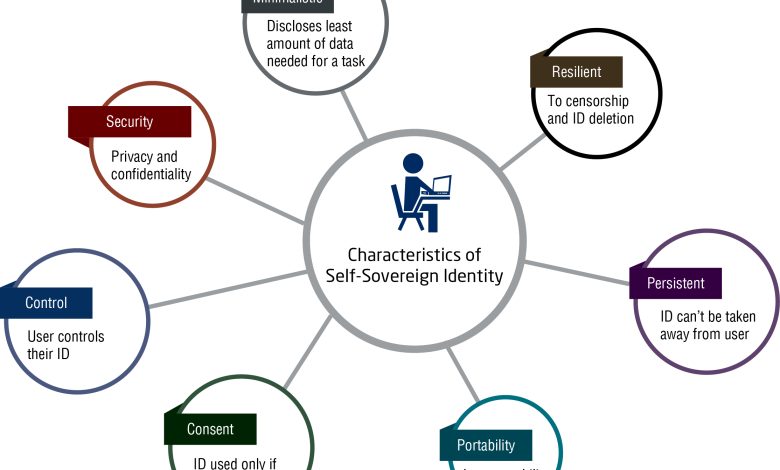The Impact of Blockchain on Digital Identity Verification

- The Evolution of Digital Identity Verification
- Understanding Blockchain Technology
- Enhancing Security with Blockchain
- The Role of Decentralization in Identity Verification
- Challenges and Opportunities in Blockchain-based Identity Verification
- The Future of Identity Verification in the Blockchain Era
The Evolution of Digital Identity Verification
The evolution of digital identity verification has been greatly impacted by the introduction of blockchain technology. Blockchain has revolutionized the way identities are verified online, providing a secure and decentralized method for storing and verifying personal information. This technology has enabled individuals to have more control over their own identities, reducing the risk of identity theft and fraud.
One of the key benefits of using blockchain for digital identity verification is the increased security it provides. By storing identity information in a decentralized and encrypted manner, blockchain makes it much more difficult for hackers to access and manipulate personal data. This has led to a significant decrease in identity theft cases, providing individuals with greater peace of mind when sharing their information online.
Furthermore, blockchain has also improved the efficiency of digital identity verification processes. By streamlining the verification process and reducing the need for third-party intermediaries, blockchain has made it quicker and easier for individuals to verify their identities online. This has not only saved time for both individuals and businesses, but has also reduced costs associated with identity verification.
Overall, the evolution of digital identity verification through blockchain technology has had a profound impact on the way personal information is stored and verified online. With increased security, efficiency, and control over one’s own identity, blockchain has become a game-changer in the world of digital identity verification.
Understanding Blockchain Technology
Blockchain technology is a decentralized, distributed ledger system that securely records transactions across a network of computers. Each transaction is stored in a “block” that is linked to the previous block, forming a chain of blocks – hence the name “blockchain.” This technology ensures transparency, security, and immutability of data, making it ideal for digital identity verification.
One of the key features of blockchain technology is its ability to provide a tamper-proof record of transactions. Once a block is added to the chain, it cannot be altered without the consensus of the network participants. This makes blockchain a highly secure and reliable system for verifying digital identities.
Blockchain technology also eliminates the need for intermediaries in identity verification processes. By using cryptographic algorithms, individuals can prove their identity without relying on third-party verification services. This not only streamlines the verification process but also reduces the risk of identity theft and fraud.
Moreover, blockchain technology allows for the creation of self-sovereign identities, where individuals have full control over their personal information. This means that users can choose what information to share and with whom, enhancing privacy and data security in the digital world.
In conclusion, blockchain technology has the potential to revolutionize digital identity verification by providing a secure, transparent, and decentralized system for verifying identities. Its tamper-proof nature, elimination of intermediaries, and promotion of self-sovereign identities make it a powerful tool for enhancing security and privacy in the digital age.
Enhancing Security with Blockchain
Blockchain technology has revolutionized digital identity verification by enhancing security measures. By utilizing decentralized and encrypted ledgers, blockchain ensures that personal information is securely stored and verified without the need for a central authority. This eliminates the risk of data breaches and identity theft, providing users with a more secure and reliable verification process.
The Role of Decentralization in Identity Verification
Decentralization plays a crucial role in identity verification within the realm of blockchain technology. By distributing verification processes across a network of nodes rather than relying on a central authority, decentralization enhances security and trust in digital identity verification.
One key advantage of decentralization in identity verification is the elimination of a single point of failure. With traditional centralized systems, a breach in security or a hack of the central database can compromise the entire identity verification process. In a decentralized system, however, the verification data is spread across multiple nodes, making it much more difficult for malicious actors to manipulate or corrupt the information.
Furthermore, decentralization promotes transparency and immutability in identity verification. Each transaction or verification process is recorded on the blockchain, creating a permanent and tamper-proof record of identity-related activities. This not only enhances security but also provides individuals with greater control over their own digital identities.
Another benefit of decentralization in identity verification is the potential for increased efficiency and cost-effectiveness. By removing the need for intermediaries or third-party verification services, decentralized systems can streamline the verification process and reduce associated costs. This can be particularly advantageous in industries such as finance, healthcare, and supply chain management, where identity verification is a critical component of operations.
Challenges and Opportunities in Blockchain-based Identity Verification
Blockchain technology presents both challenges and opportunities in the realm of digital identity verification. One of the main challenges is the issue of scalability. As more and more transactions are added to the blockchain, the network can become congested, leading to slower verification times. However, this challenge also presents an opportunity for innovation in the form of new consensus algorithms and network upgrades to improve scalability.
Another challenge is the issue of privacy. While blockchain offers a secure and transparent way to verify identities, it also raises concerns about the privacy of personal information stored on the blockchain. This challenge can be addressed through the use of encryption and zero-knowledge proofs to ensure that sensitive data remains confidential.
On the other hand, blockchain technology also brings about opportunities for more secure and efficient identity verification processes. By using blockchain, individuals can have more control over their own identities, reducing the risk of identity theft and fraud. Additionally, blockchain can enable cross-border identity verification, making it easier for individuals to access services and participate in global transactions.
The Future of Identity Verification in the Blockchain Era
In the blockchain era, the future of identity verification is undergoing a significant transformation. Blockchain technology offers a secure and decentralized way to verify digital identities, reducing the risk of fraud and identity theft. By leveraging blockchain for identity verification, individuals can have more control over their personal information and how it is shared online.
One of the key advantages of using blockchain for identity verification is the immutability of the data stored on the blockchain. Once information is recorded on the blockchain, it cannot be altered or tampered with, providing a high level of security and trust in the verification process. This can help prevent identity fraud and ensure that individuals are who they claim to be.
Another benefit of blockchain-based identity verification is the elimination of the need for third-party intermediaries, such as banks or government agencies, to verify identities. This can streamline the verification process, reduce costs, and increase efficiency. Additionally, blockchain technology can enable individuals to have a single digital identity that can be used across different platforms and services, simplifying the verification process for both users and businesses.
As blockchain technology continues to evolve and become more widely adopted, the future of identity verification looks promising. With its emphasis on security, decentralization, and efficiency, blockchain has the potential to revolutionize the way digital identities are verified and managed. By embracing blockchain for identity verification, individuals and businesses can benefit from a more secure and streamlined verification process in the digital age.






